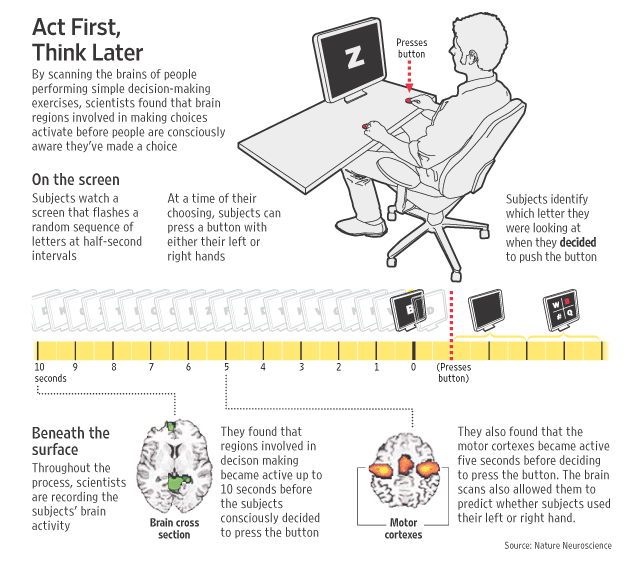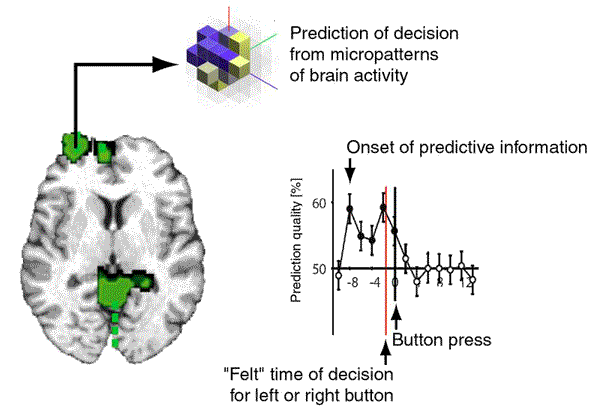
Unconscious Decisions in the Brain
Informationsdienst Wissenschaft, April 2008
Edited by Andy Ross
Several seconds before we consciously make a decision its outcome can be
predicted from unconscious activity in the brain. This is shown by a study
of scientists from the Max Planck Institute for Human Cognitive and Brain
Sciences in Leipzig, in collaboration with the Charité University Hospital
and the Bernstein Center for Computational Neuroscience in Berlin. The
researchers from the group of Professor John-Dylan Haynes used a brain
scanner to investigate what happens in the human brain just before a
decision is made.
In the study, participants could freely decide if
they wanted to press a button with their left or right hand. They were free
to make this decision whenever they wanted, but were asked to remember
exactly when they felt they had made up their mind. The aim of the
experiment was to find out what happens in the brain in the period just
before person felt the decision was made. The researchers found that it was
possible to predict from brain signals which option participants would take
already seven seconds before they consciously made their decision.
This unprecedented prediction of a free decision was made possible by
sophisticated computer programs that were trained to recognize typical brain
activity patterns preceding each of the two choices. Micropatterns of
activity in frontopolar cortex were predictive of the choices even before
participants knew which option they were going to choose. The decision could
not be predicted perfectly, but prediction was clearly above chance. This
suggests that the decision is unconsciously prepared ahead of time but the
final decision might still be reversible.
Haynes: "Most researchers
investigate what happens when people have to decide immediately, typically
as a rapid response to an event in our environment. Here we were focusing on
the more interesting decisions that are made in a more natural, self-paced
manner."
More than 20 years ago the American brain scientist Benjamin
Libet found a brain signal, the readiness potential, that occurred hundreds
of milliseconds before a conscious decision. Libet's experiments were highly
controversial and sparked a long debate. Many scientists argued that if our
decisions are prepared unconsciously by the brain, then our feeling of free
will must be an illusion. In this view it is the brain that makes the
decision, not the conscious mind.
In contrast, Haynes and colleagues
now show that brain activity predicts up to 7 seconds ahead of time how a
person is going to decide. But they also warn that the study does not
finally rule out free will: "Our study shows that decisions are
unconsciously prepared much longer than previously thought. But we do not
know yet where the final decision is made. Especially we still need to
investigate whether a decision prepared by these brain areas can still be
reversed."

Image: John-Dylan Haynes
Brain regions (shown in green) from which the outcome of a participant's
decision can be predicted before it is made. The top shows an enlarged 3D
view of a pattern of brain activity in one informative brain region.
Computer-based pattern classifiers can be trained to recognize which of
these micropatterns typically occur just before either left or right
decisions. These classifiers can then be used to predict the outcome of a
decision up to 7 seconds before a person thinks to be consciously making the
decision.
Unconscious determinants of free decisions in the human brain
Chun Siong
Soon, Marcel Brass, Hans-Jochen Heinze, John-Dylan Haynes
Nature
Neuroscience May 2008
My earlier report of this news in German
AR This is a good piece of work. It is much
more convincing as a refutation of airy philosophical claims about free will
than most of the philosophical arguments one can muster.
By Eddy Nahmias
Big Questions Online, August 2012
Edited by Andy Ross
Neuroscientists say free will is an illusion. But few philosophers say free
will conflicts with a naturalistic understanding of the mind. When told
stories about persons whose decisions are fully caused or even predicted by
earlier events, most people say they still have free will. People associate
free will and moral responsibility with the capacity to make conscious
decisions and to act accordingly.
Activity in the brain precedes our
conscious decision making by up to several seconds. If such early brain
activity always completely determines what we do, then our conscious
thinking happens too late. But the data does not show that early brain
activity completely causes all of our decisions. Whether consciousness plays
a role in our complex behavior turns on whether the neural correlates of
conscious processes occur at the right time and place to influence behavior.
A more complete scientific theory of the mind will have to explain how
consciousness and rationality work, rather than explaining them away.
Research suggests that our conscious reasoning and planning is not
pulling the strings as much as we tend to believe. We are subject to biases
and influences beyond our awareness, and we sometimes confabulate or
rationalize our behavior. But our deliberations and decisions can have an
influence. Free will involves capacities that have limitations. Neuroscience
provides new insights here.
